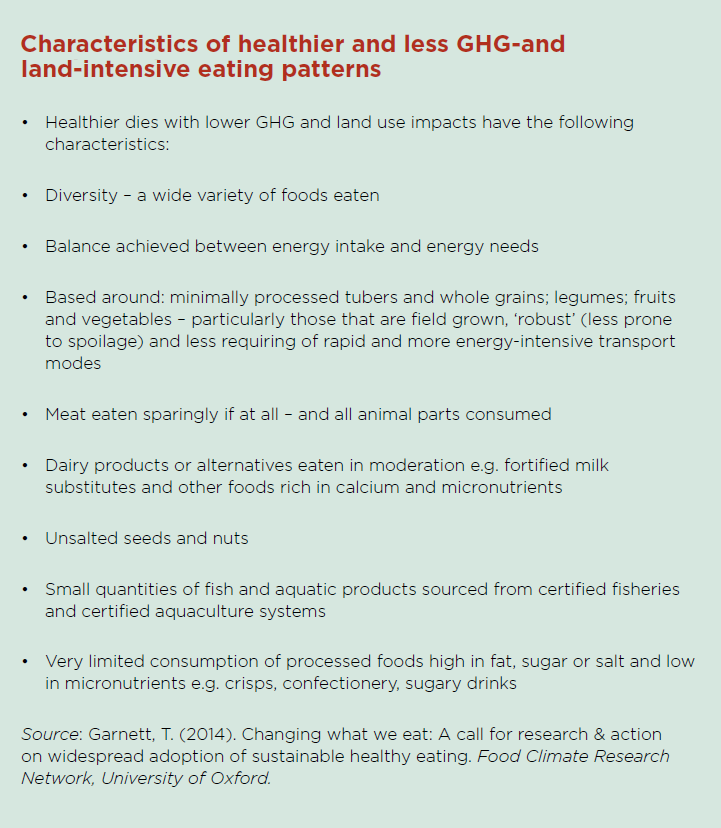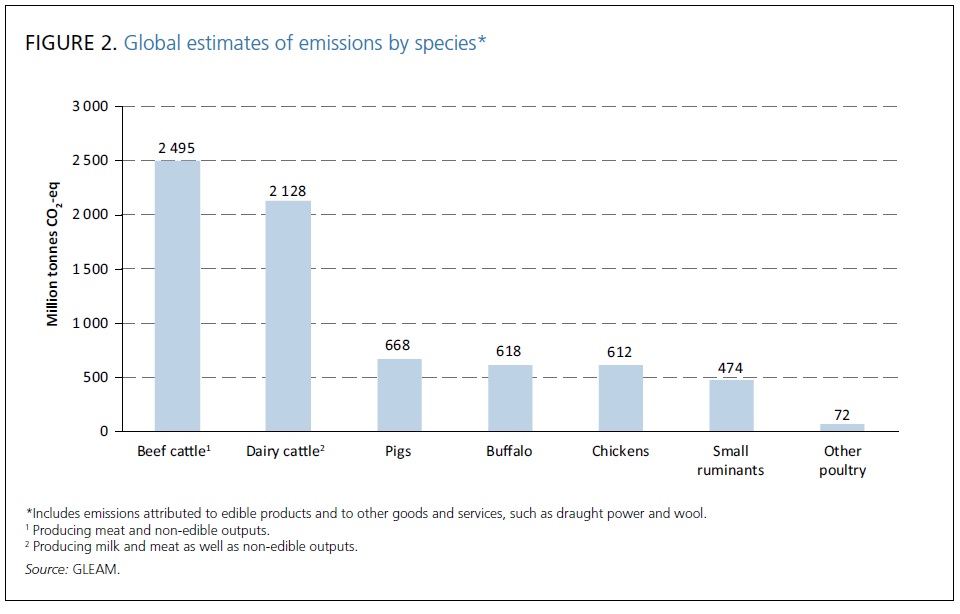Sustainable diets
One of the emerging strategies for tackling the environmental cost of our food system, and the associated health problems of unhealthy eating, is the idea of shifting diets in a sustainable direction. The food system problem, referred to by Tilman & Clark (2015) as the “diet-environment-health trilemma” can be summed up as follows;
producing food contributes to climate change, climate change in turn makes it more difficult to grow food, but the global population is increasing necessitating an increase in production to meet rising demands but with less environmental impact. Coupled with these issues is the dysfunctional quality of the food system in which over 800 million people are chronically hungry, 2 billion people are overweight, and 2 billion people suffer from micro-nutrient deficiencies. As populations become wealthier, dietary patterns shift towards more resource intensive foods and a greater amount of food waste. Also, there is only so much land available to grow food, and it is accepted that further conversion of land to agriculture must be avoided.
The extent to which food production needs to be increased is debatable, and many would argue that increasing production won’t solve the problems of inadequate distribution and inequality which contribute to hunger today. Nevertheless, there is a general agreement that some kind of increase is necessary to meet the needs of the projected global population of 9 billion at roughly mid century.
The environmental cost of the food system is fairly well understood by now. Globally, it contributes to between 25 and 30% of greenhouse gas (GHG) emissions, making it the second largest contributor after energy production. Deforestation, biodiversity loss, consumption and pollution of scarce water, and over-fishing are also major environmental issues related to food production. To feed a growing population whilst reducing these negative environmental consequences is the primary challenge of our food system this century, and so a number of strategies are being proposed – increasing the “efficiency” of the system (something I will discuss in another post), reducing food losses and food waste, reforming the governance of the food system (to, for example tackle the issues of distribution and inequity mentioned above), and finally the adoption of sustainable healthy diets.
So what are sustainable diets? The FAO and Bioversity international define them as “those diets with low environmental impacts which contribute to food and nutrition security and to healthy life for present and future generations. Sustainable diets are protective and respectful of biodiversity and ecosystems, culturally acceptable, accessible, economically fair and affordable; nutritionally adequate, safe and healthy; while optimizing natural and human resources.”
So what does that actually look like? What kind of characteristics might sustainable diets have? A potential answer to this question is owed to the pioneering work of Tara Garnett and the Food Climate Research Network (UK), who propose the characteristics listed in the figure below.
Certain foods are much more resource intensive and result in higher GHG emissions than others and meat products stand out in this regard [see the figure below from the FAO’s GLEAM project]. Much of the discussion about sustainable diets revolves around the role of meat and meat products, since livestock production itself embodies so many of the issues related to the ‘diet-environment-health trilemma’ – high emissions, huge water and land requirements, production of human food-competing-feeds, biodiversity loss, poor health outcomes from processed meats (although the health impact depends on the type of meat). Plant based diets have been shown to have much less climate impact and are associated with positive health outcomes.
So should we all become vegan? Such a solution is far too simplistic and does not take into account the diverse needs of different people. For example, livestock provide an important source of livelihoods for many people in the global south where many children also require meat as an important source of protein and micro-nutrients for their development. However the level of consumption of meat in many high-income countries is far beyond nutritional requirements as well as being unsustainable. In fact, reducing meat consumption in these countries to the level already recommended in most national dietary guidelines would result in a huge decrease in GHG emissions from the food system. Going beyond this reduction and substituting meat products for plant based products could be even more beneficial for the environment.
Ultimately, sustainable diets will be context/region specific, and the publication of sustainable dietary guidelines in some countries (only 4 so far – see the FAO/FCRN joint publication below) is an important development that needs to be built upon with a policy and regulatory framework that supports such eating habits. Widespread adoption of such diets has massive potential for helping address climate change and makes perfect sense for the future of our food system.
Below is a list of resources for further exploration.
Food Bytes – A fantastic resource by the Food Climate Research Network on food systems and sustainability, containing references to supporting journal articles.
University of Minnesota Environment Reports – Change your diet
Carbon Brief article on food demand and climate change targets
Plant-based diets could save millions of lives and dramatically cut greenhouse gas emissions
Barilla Center Double Pyramid – recommendations for a healthy sustainable diet
Live well plate – recommendations for sustainable diets
FCRN publication – What is a Sustainable Healthy Diet?
Chatham House Report – Changing climate, changing diets: Pathways to lower meat consumption

